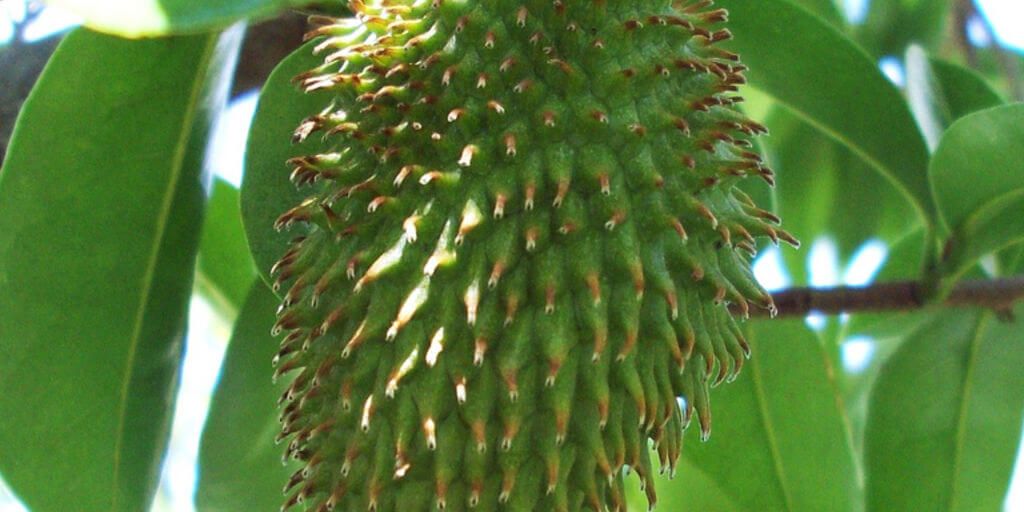The Soursop Tree (Annona muricata), also known as Graviola, is a tropical fruit tree native to Central and South America. It is known for its unique flavor and various health properties. It is widely used by many indigenous cultures for a variety of physical ailments.
Many parts of the tree are used, including the leaves, fruit, bark and seeds, and each provides its own set of healing properties. Ongoing studies into the health benefits of Soursop are looking into this natural elixir as a possible cancer treatment.
Habitat of Soursop
The Soursop Tree is a broad leaf, evergreen tree that produces flowers and fruit. The trees is indigenous to the rain forest regions, growing in areas with high humidity and warm temperate winters, including; Cuba, Mexico, South America, Central America and the Caribbean. The Graviola Soursop tree belongs to the muricata species of trees, which is classified in the Annona subdivision of the Annonaceae tree family.
Soursop Fruit
The most widely known part of the Soursop tree is of course the Soursop fruit, also known as Graviola fruit. The name ‘Soursop’ is actually the name of the fruit produced by the Soursop tree. The fruit appears in large, heart-shaped forms with a yellow-green, spiky skin and white fleshy interior. Much like the name implies, the fruit is fairly acidic with a taste that resembles a mix of strawberry and pineapple.
Active Ingredients in Soursop Fruit
Soursop is a tropical fruit rich in essential vitamins and minerals. It has antioxidant and immune-boosting properties due to its high vitamin C content, and may help reduce inflammation and fight infections. Soursop fruit also shows potential as an antimicrobial agent and has been studied for its possible anticancer effects, particularly against certain types of cancer cells.
Additionally, soursop fruit supports digestive health, cardiovascular function and overall well-being. Below we will explore these benefits in more detail:
Rich in Nutrients: Soursop fruit is packed with essential vitamins and minerals, including vitamin C, vitamin B6, folate, potassium, magnesium, and fiber. These nutrients contribute to overall health and well-being.
Antioxidant Properties: Soursop contains antioxidants like flavonoids, phenolic compounds, and acetogenins, which help neutralize harmful free radicals in the body. Antioxidants play a crucial role in reducing oxidative stress and lowering the risk of chronic diseases.
Immune-Boosting: The high vitamin C content in soursop can help strengthen the immune system, promoting better defense against infections and illnesses. Regular consumption of soursop may support overall immune function.
Anti-Inflammatory: Soursop has been traditionally used in herbal medicine to reduce inflammation and alleviate pain associated with conditions like arthritis and rheumatism. Some studies suggest that soursop may have anti-inflammatory properties, although more research is needed.
Antimicrobial: Soursop has been investigated for its potential antimicrobial properties, which may help fight against bacterial and fungal infections. Some studies have shown that soursop extract exhibits antibacterial and antifungal activity against certain pathogens.
Anti-cancer Potential: Soursop contains bioactive compounds called acetogenins, which have been studied for their potential anticancer effects. Some research suggests that soursop extract may inhibit the growth of cancer cells and induce apoptosis (cell death) in cancerous tissues. However, more clinical studies are needed to determine its efficacy and safety for cancer treatment.
Digestive Health: Soursop is rich in fiber, which promotes healthy digestion and regular bowel movements. Consuming soursop as part of a balanced diet may help prevent constipation and improve overall digestive health.
Cardiovascular Support: Potassium, found in abundance in soursop, is essential for heart health and helps regulate blood pressure. Adequate potassium intake from foods like soursop may lower the risk of hypertension and cardiovascular disease.
Health Benefits of Soursop
In areas native to the Soursop, the fruit, leaves and seeds serve a variety of medicinal purposes, which we will discuss below:
Soursop Fruit & Juice
Soursop fruit contains a high level of carbohydrates and fructose, which is a natural sugar. Significant levels of vitamin B1 and B2 and vitamin C are also found in Soursop. The juice from the Soursop is often used as a diuretic. People who reside within the South America, Central America and Mexico regions also use the juice for other conditions, such as scurvy and dysentery.
Soursop Leaves, Bark and Root
Concoctions made from Soursop leaves, bark and root are used for a range of treatment remedies, some of which include:
- Alleviating arthritis pain
- Reducing joint inflammation
- Reducing inflammation in nasal passages and the respiratory tract as a whole
- As a tranquilizer or sedative
- To treat skin conditions like eczema
- Treat symptoms of diabetes
Soursop Seeds
Pulverized Soursop seeds are used as skin astringents, to kill off bedbugs and head lice, and to reduce muscle spasms.
Soursop for Cancer Treatment
Laboratory research studies conducted on mice show promise for Soursop leaf, seed and fruit extracts as potential treatments to reduce or eliminate the spread of cancer cells in the body. The active ingredients contained inside these portions of the plant are known as Annonaceous acetogenins and only exist within the Annonaceae plant family.
Ongoing studies conducted by Purdue University and the National Institute of Health have examined the antitumor properties of Annonaceous acetogenins and uncovered some conclusive findings on the cancer treatment potential of Soursop.
Acetogenins are active compounds capable of preventing abnormal or cancer-type cells from producing the energy they need to grow and reproduce. They do this by interfering with the enzyme processes involved in producing ATP, the energy molecules that fuel cell activity. Without these molecules, cells are unable to carry out the basic functions that keep them alive and allow them to reproduce.
These compounds also inhibit blood flow to abnormal cell bodies which work to cut off their nutrient supplies. Studies conducted by the National Cancer Institute also show these effects of Soursop extracts on several forms of cancer, some of which include:
- Breast cancer
- Pancreatic cancer
- Lung cancer
- Liver cancer
- Prostate cancer
How to Prepare Soursop
When considering herbal or plant remedies, the type of condition being treated often determines the type of treatment preparation needed. Herbal treatment preparations come in capsule, tea or tincture forms. Each method is designed to draw out certain medicinal properties of the plant. Tea preparations draw out the anti-inflammatory properties of the plant while tincture preparations enhance the plant’s antibacterial properties.
Standard dosages for Soursop based on type of preparation are:
- Capsules/tablets – 2 grams, three times a day
- Tinctures – 2 to 4 ml, three times a day
- Teas – 1 cup, three times a day
The effects of Soursop in capsule form depend on what properties of the plant exist as active ingredients in the capsule. As Soursop contains several different types of acetogenins, identifying the type of acetogenin needed to treat a condition will determine which active ingredients to look for on the label.
Shopping
| Visit the new SHOPPING page for a wide selection of great products! |
Always take care when taking herbs and Read Our Disclaimer.
Soursop Herb Notes / Side Effects
Latin Name
Annona muricata
Common Names
Graviola, Soursop, Guanaba, Corossol, Brazilian paw paw, Guanavana.
Properties of Soursop
Antioxidant, anti-cancer, diuretic, anti-inflammatory, antimicrobial, astringent, sedative.
Soursop is Indicated for:
Immune boosting, cancer, digestive health, cardiovascular support, arthritis pain, muscle spasms, bed bugs, head lice, joint inflammation, respiratory tract inflammation, sedative, eczema, diabetes.
⚠️ Side Effects & Precautions of Soursop (Graviola)
Soursop (Graviola) is celebrated for its immune-boosting, anti-inflammatory, and potential anticancer properties. However, it can have side effects, especially when consumed in large amounts or over prolonged periods.
🟠 Neurological Symptoms (High Doses)
Soursop contains compounds called annonacin and acetogenins, which in high doses or prolonged consumption may cause neurological effects:
- Tremors
- Movement disorders similar to Parkinson’s disease
- Nerve damage (neuropathy)
⚠️ Limit intake and avoid long-term, high-dose use.
🟠 Lowered Blood Pressure
Soursop may lower blood pressure significantly, which can be helpful but also potentially risky for people already on medications for hypertension.
✅ Monitor blood pressure closely, especially if on medication.
🟠 Blood Sugar Reduction
The fruit may lower blood sugar, useful for diabetics but risky if combined with blood sugar medications.
⚠️ Diabetics should consult their doctor before regular consumption.
🟠 Digestive Issues
Some people experience:
- Nausea
- Stomach discomfort
- Diarrhea, especially when consuming large amounts.
🟠 Possible Interaction with Medications
Soursop can interact with medications, particularly:
- Antihypertensives (blood pressure drugs)
- Antidiabetic medications
- Medications for neurological conditions
Always consult your healthcare provider if on prescribed medication.
🟠 Pregnancy and Breastfeeding
There’s insufficient research on safety during pregnancy and breastfeeding, so it’s best avoided during these times.
🟢 Summary & Safe Usage Tips:
- Use Soursop moderately and short-term.
- Avoid high-dose supplements unless professionally guided.
- Monitor closely if you have neurological conditions, diabetes, or low blood pressure.



Leave a Reply